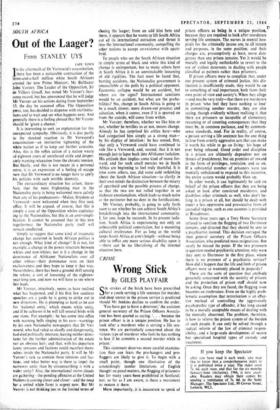Out of the Laager?
SOUTH AFRICA
From STANLEY UYS
It is interesting to seek an explanation for this unexpected sympathy. Obviously, it is due partly to the shocked reaction to Dr Verwoerd's assassination—an instinctive tightening of the white nation as if to keep out further assassins. Also, this is the reflex action of a nation weary of eighteen years of unrelieved strife and desper- ately wanting relaxation from the chronic tension. But finally, and this is not meant in a personal sense, it is an expression of a feeling of escape now that Dr Verwoerd is no longer here to apply his policies with such terrible intensity.
The extraordinary situation has arisen, there- fore, that the most frightening man in the Nationalist party is being welcomed more calmly than any of his predecessors—Malan, Strydom or Verwoerd—were welcomed when they first took office. It will be argued, of course, that this is simply a case of the Opposition whites capitulat- ing to the Nationalists, but this is an over-simpli- fication. It cannot be assumed that in this new togetherness the Nationalist party itself will remain unaffected.
Simply to suggest that some kind of traumatic change has occurred in South African politics is not enough. What kind of change? It is not, for example, a change in the power structure between whites and non-whites; nor is it a change in the dominance of Afrikaner Nationalists over all other whites—their dominance rests on their exclusiveness and they hope to keep it that way. Nevertheless, there has been a ground shift among the whites, a sort of loosening of the eighteen- year-long jam, and now we will have to see where this leads.
Mr Vorster, intuitively, seems to have realised what has happened, and if his first few cautious speeches are a guide he is going to strike out in new directions. He is plumping as hard as he can for 'national unity,' which means white unity, and if he achieves it he will kill several birds with one stone. For example: he has come into office with warning bells ringing in his ears—warnings by his own Nationalist newspapers that Dr Ver- woerd, who had ruled so aloofly and dangerously, bad died politically intestate, leaving neither direc- tions for the further administration of the estate nor an obvious heir; and that, with his departure latent tensions and factions could manifest them- selves inside the Nationalist party. It will be Mr Vorster's task to contain these tensions and fac- tions, and what better way is there to impel the narrower unity than by circumscribing it with a wider unity? Also, the international storm clouds are gathering—the pending offensive at the United Nations is coming closer and closer—and the need for a united white front is urgent now. But Mr Verger is not thinking just in the limited terms of
closing the laager; from an odd hint here and there, it appears that he wants to lift South Africa out of its international ostracism and thrust -it into the international community, compelling the other nations to accept co-existence with apart- heid.
To people who see the South African situation in simple terms of black and white this kind of change is unimportant, but to many others here in South Africa it is an unmistakable loosening of old rigidities. The fact must be faced that, barring accidents, the Nationalist government is unassailable at the polls by a political opponent. Economic collapse would be an accident, but where are the signs? International sanctions would be an accident, but what are the proba- bilities? No, change in South Africa is going to be a much slower, more drawn-out process; and salvation, when it comes, even if it is spurred on from the outside, will come from within.
Mr Vorster, therefore, whether we like him or not, whether he terrifies us or not, means change. Already he has surprised his critics here—who had categorised him simply as a strong man— by his display of intuition: he has sensed, first, that only a Verwoerd could have continued to rule like a Verwoerd, and, second, that it is not enough just to lapse back into Afrikaner isolation. His attitude thus implies some kind of move for- ward, and for such small mercies we in South Africa are beginning to feel truly thankful. It is time some others, too, did some cold rethinking about the South African situation—to clarify in their own minds the distinction between the misery of apartheid and the possible process of change, so that the two are not rolled together in an inchoate emotionalism, which leads to much noise at the perimeter but no dent in the fortifications.
Mr Vorster, probably, is going to sally forth soon to see whether he can achieve South Africa's breakthrough into the international community. I, for one, hope he succeeds. In its present isola- tion, South Africa is experiencing not only an unbearable political constriction, but a mounting cultural intolerance. For as long as the world keeps South Africa at arm's length—without being able to inflict any more serious disability upon it —there can be no liberalising of the internal situation here.


































 Previous page
Previous page